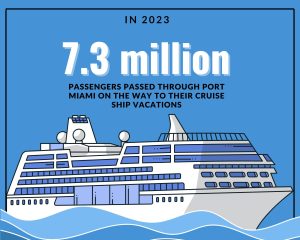Cruise ships at Port Miami will be able to plug into the county’s power grid – a move that officials say will boost the local economy by attracting more cruise lines to the area while cutting down on pollution.
There’s just one problem. More ships means an increase in the possibility of cruise ship injuries, a practice area that Leesfield & Partners knows all too well.
The decision was spurred by sustainability efforts from Miami-Dade County Mayor Daniella Levine Cava who told reporters in an article published in The Miami Herald that the project would bring the county that much closer to cutting down on its carbon emissions.
Five companies have supported the decision, including Norwegian Cruise Line, Carnival Cruise Line, and Royal Caribbean International Group. Starting this week, up to three ships can tap into the power grid on land. Cruises typically keep the ship’s engine running to have power going for its crew and staff. This move will allow the ships to have the engine off and be powered by on-land power sources, totaling up to 16 megawatts. Each ship will need between eight and 13 megawatts to power it, according to local reporting. To power one ship is the equivalent of 10,000 households in a single day which, compared to the City of Miami as a whole, officials said in the article, is “not a lot.”
Past Cases Involving Cruise Lines
Already on the schedule to be connected to the shore power source is Carnival’s Icon of the Seas, a ship with the capacity to carry about 8,000 people and has been deemed the largest ship in the world. With more ships bringing more people onboard, the potential risk of injury increases tenfold. With hundreds of past cruise line wrongful death and personal injury cases behind them, attorneys at Leesfield & Partners know firsthand just how hazardous these cruise lines can be.

In 2023, approximately 7.3 million people went through Port Miami on their way to their cruises.
There are several reasons cruise ships become a breeding ground for such injury. One such reason involves the on-board medical staff. Many times, the doctors, nurses and other medical officials touted to have years of experience and accolades in their field while working in state-of-the-art facilities are not all they are made out to be. Leesfield & Partners has seen many cases in which the medical staff have been ill-equipped to handle the medical emergencies brought to them from passengers.
Just recently, a Georgia woman was left stranded by a Carnival Cruise Line in a foreign country while she was sedated and on a ventilator with a collapsed lung. This harrowing story is not uncommon. One woman was abandoned by her cruise ship while suffering a hemorrhagic stroke at an airport. Cruise officials failed to ensure that the airport where they left their passenger was open and she died while waiting to be transferred to a hospital.
Many times, the doctors aboard cruise ships do not meet American standards for schooling or certification. This much was true for a man represented by Leesfield & Partners who was working on a cruise ship when he went to the infirmary after feeling nauseous. Instead, he was given a massive dosage of medicine that was inadequately administered resulting in extreme pain and the loss of his right arm. Leesfield & partners secured over $3 million in damages in that case. Additionally, railings and non-compliant safety measures on board often have devastating results. This was the case for a little girl whose family was represented by Leesfield & Partners. The child wandered away from her family and, when she leaned over a railing that gave way, fell five stories to her death.
Cruise lines compete to have “bigger and better” on-board activities such as dangerous water slides, rock climbing and go-karting experiences. These activities are created to keep passengers entertained on long stretches of cruising through international waters and are fueled by economic gain to the company. These experiences often result in sprains, broken bones and dental injuries. With added amenities such as these experiences compiled with casinos, bars that over serve guests, cruises become a hotbed for injuries and criminal activity. In a 2023 report demonstrating the amount of reported incidents involving violent activities and theft on ships, it was revealed that there were 131 sex crimes reported to the FBI on ships coming in and out of the United States. Of those reported incidents, 52 were sexual assaults and 79 were rapes. Just a year before, when the data did not differentiate between sexual assaults and rapes, there were 87 alleged incidents.
 Cruise Ship Lawyers Blog
Cruise Ship Lawyers Blog


